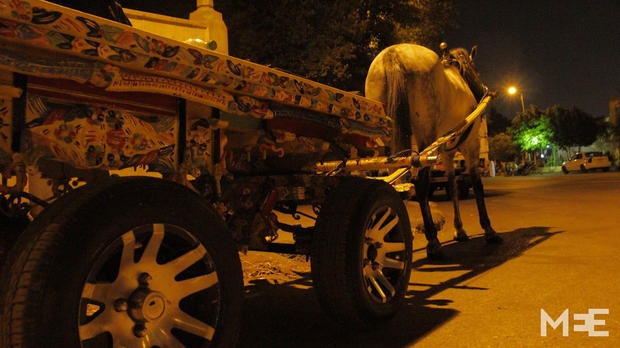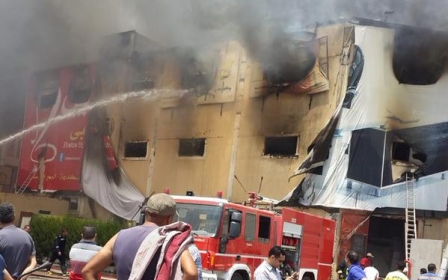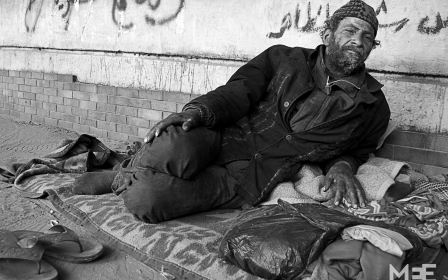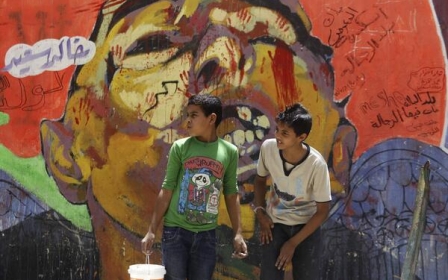Fast and furious: The horse cart racers of Cairo
CAIRO - It’s Sunday night on al-Khayala street in the south of Cairo, and the man atop the horse cart turns his head suddenly as a car whizzes by at high speed. He jerks his cart to a sudden halt, a difficult task considering how fast he is going, and pulls to the side in order to avoid an accident and let the impatient cars overtake him.
Seconds later, he makes a dramatic U-turn and speeds into the lane on the other side of the road. The sound of the whip on the flank of the horse is unmistakable despite the sounds of car horns and motorcycle engines which fill the street, and the roar of the vehicles which are almost always seemingly on the verge of crashing into one another.
His horse begins trotting, transitioning into a gallop after a few more cracks of the whip, but then the rider has to dramatically reduce his speed just before he hits a bump, once again causing an obstruction as drivers pull off risky manoeuvres in order to avoid ploughing into his cart.
Moments later, another rider and his cart noisily jump over the bump, raising cheers from the small crowd that has gathered to watch. Amidst all of this, a police van happens to drive by and barely slows down before moving along the road, away from the makeshift racetrack.
Another night of drag racing horses comes to an end.
Dangerous entertainment
The drag-racing horse carts on al-Khayala street are a familiar sight. In daylight, it is just one of the many dusty and packed streets of Masr al-Qadima, a suburb south of Cairo. The road connects the two biggest highways in the city, the Ring Road and Salah Salem. The wide Imam al-Shafi'i cemetery runs alongside the street, while on the opposite side stand high buildings for residential use.
Every Sunday night, however, about one kilometre of the street turns into a track for horse races. The circuit has no ropes or any other kind of barriers but a kerb that separates the two sides of the road where the small crowd take a seat on their carts or on the pavement.
“Competitions started a few years before the 2011 revolution,” says Hamdy, a middle-aged vegetable seller and butcher whose small shop is located a few metres away from the finish line.
According to some of the riders, this popular but dangerous entertainment dates back to the 1930s. Regardless of the sport's history, however, the way races take place has never changed.
“Participants and spectators gather along the street around 9:30pm and once there are a sufficient number of riders the show kicks off,” said Hamdy.
“The Prophet Mohammed said to teach your children how to swim, how to shoot and how to ride horses,” added Mahmoud, who roams al-Khayala street with his cart every day, collecting broken electronics and furniture that he eventually repairs and sells.
“I don’t know how to swim, I am not a good shooter, but I have ridden horses since I was young,” he continued while his friends hop onto the cart before the race begins.
The event looks like a gathering among people, if not quite friends, who have known each other a long time. Many of them come from the same neighbourhood, but there are also those who come from Giza, Manshiet Nasr, Abdeen, Matareya and other areas, who use their free time to watch or take part in the races.
Ahmed, a fruit vendor living in Manshiet Nasr, is proud of his horse Battal at-thawra – which translates as hero of the revolution – an eight-year-old grey who runs in a number of competitions in al-Khayala and Ain el-Sirah.
Ahmed and his best friend Said enjoy their time during the races, letting Battal run as much as he can or showing their Alexandrian-style decorated wagon.
“For some it is just a way to spend his free time, but there are also those who come to have the names of their horses on everyone’s lips and be proud of it,” Ahmed said. Even though they prefer to run in other areas such as Giza or Shubra, Ahmed and Said regularly attend the al-Khayala racing because “we are a group of friends and we want to share this passion for horses”.
Some people use the track as a training area for young horses. Their left and right front legs are tied to the opposite limb on the back, forcing horses to go slower, keeping a regular stride and to control their impetuous nature. In this way, they learn how to trot and, later, to gallop.
Other riders, some of them very young, just want to go fast, either alone or with a group of friends seated on the cart whose loud voices and cheers compete with the car horns or Egyptian popular music pumped out from Vespa motorcycles.
Winning nothing but praise
Sometimes cart drivers who take part in the race run side-by-side along the track, narrowly missing cars, microbuses and anything else in their path, putting on a show as dangerous as the competition and as widely appreciated by the spectators.
“Some participants may ride carelessly and this is not good because people might get injured,” said Ahmed.
A cart may crash into another wagon or run into the kerb. Some horses have died because of those accidents and, according to some eyewitnesses, a child was killed after a cart ran over him in 2006 in a street close to al-Khayala. It was not possible for MEE to verify this information, but after 2006, the police pressured the community to move the races to al-Khayala.
The races have neither a winner nor any kind of formal structure or organisation.
Everything is decided on the spot, participants may ride their horses on their own, or enjoy a challenge with other riders. Monetary betting and gambling is not allowed, but no one really checks.
The “winner” is whoever distinguishes himself by riding a fast and talented horse - called a rahawaan - and that always goes hand in hand with positive comments from the crowd.
But with praise, the horse's market value skyrockets. Someone with an interest in a specific horse may contact the owner and make an offer.
Though the races do not operate as a horse market per se, purchasers and vendors might meet at the races for the first time and reach an agreement afterwards, with prices for a horse ranging from a few thousand Egyptian pounds up to more than 500,000 ($65,000).
Carts too may be expensive. Some of them can cost up to 50,000 Egyptian pounds ($6,500) and are finely decorated, equipped with fancy wheel rims or cushioned seats. Others are simple, old wooden working carts, with unstable wheel axis and lacking any sort of decoration.
Cars, microbuses and even bulldozers fill the one kilometre-long track, and it gets even worse during Ramadan, when traffic does not ease off at night.
“It’s like Fast and Furious, but here there is no Gran Torino, just horses,” says a taxi driver who regularly uses the road for work.
Security officials are aware of races held in al-Khayala. A police station is located just a few hundred metres from the track, and police vehicles regularly hit the road during the competitions.
Forgetting your cares
There is no law that explicitly forbids or allows these events. However, horse races increase the probability of accidents in a country where there are more than 12,000 fatalities each year from traffic accidents. Furthermore, riders need public streets to perform.
Since October 2014, public roads, oil fields, railway stations and gas pipelines are considered under military jurisdiction, with the army being called to assist the police in checking and keeping those facilities safe. But the increasing presence of security forces in the streets, which almost silenced opposition groups in Egypt by preventing their demonstrations and arresting their members, did not translate into practical steps against street racing.
Police officers may sometimes cut the electricity in the area, or ask to postpone races for a few days, especially soon after an accident. Far from being effective, these actions never really stop the races and instead serve to make them even more dangerous when the streetlights are switched off.
For some, the races can be an economic benefit: Said reaches al-Khayala every Sunday to sell koshari - a traditional Egyptian food - while Ashour gets to sell watermelons to a thirsty audience. But power cuts also negatively affect those who work and live near the track. Mahmoud, who runs a café in the neighbourhood, takes no delight in watching these races. “When the power goes off, the whole area goes dark and we can barely walk or work without lights,” he tells Middle East Eye. As far as Abdullah is concerned, it is not safe to let horses run in public streets because accidents frequently happen. “It is a street, not a circuit,” he says.
Working man's sport
In spite of their popularity, many people consider these horse races a dangerous form of entertainment that disrupts the daily life of the neighbourhood.
Power cuts may last for hours, forcing people to put up with the high temperature without air conditioning or fans, while cafes and kiosks dotted around the area struggle to keep their drinks fresh. For them, riders in al-Khayala are just “arbageh”, a term which indicates anyone who needs a cart and a horse to move in Cairo’s streets, either trash collectors, fruit vendors or second-hand dealers.
Beside the literal meaning, however, the term also has a negative implication as it is used to describe undisciplined drivers, and especially horse riding workers, who drive carelessly through the overcrowded Egyptian streets.
According to some like Amr, however, perceiving these riders as “riffraff is not right”.
“I work hard six days per week, getting stuck in the traffic for hours and going door to door without elevators, lifting more than 40kg of furniture or other heavy things," the 26-year-old truck driver told Middle East Eye. "I come here because I really need to stop for a moment and enjoy my life," he said.
His brother Hassan agrees: "This is my way to relax. We don’t have time or money for hobbies but watching horse races in a great way to spend an evening with friends."
New MEE newsletter: Jerusalem Dispatch
Sign up to get the latest insights and analysis on Israel-Palestine, alongside Turkey Unpacked and other MEE newsletters
Middle East Eye delivers independent and unrivalled coverage and analysis of the Middle East, North Africa and beyond. To learn more about republishing this content and the associated fees, please fill out this form. More about MEE can be found here.






